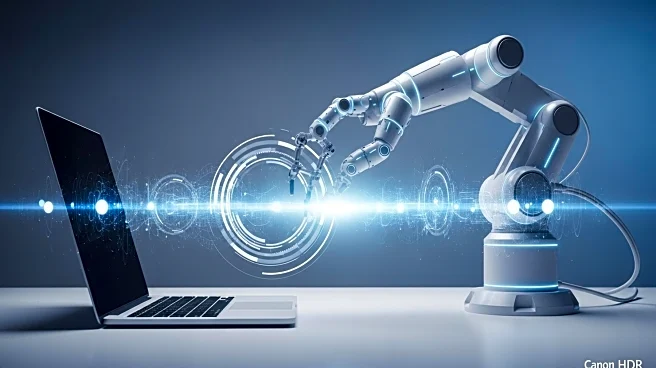What's Happening?
The integration of artificial intelligence across various sectors is reshaping employment landscapes and offering new opportunities for investors and workers. By 2025, industries such as financial services, software publishing, healthcare, and logistics are experiencing significant productivity and job creation due to advancements in AI technologies. Generative AI tools are optimizing workflows, reducing costs, and creating new revenue streams, leading to a surge in productivity growth from 7% to 27% annually. The World Economic Forum's 2025 Future of Jobs Report highlights seven key AI roles, including Machine Learning Engineer and Generative AI Specialist, which are crucial for the evolving job market. These roles require a combination of technical skills and creativity, emphasizing the need for workforce adaptation and investment in AI research and development.
Why It's Important?
The rapid adoption of AI technologies is creating a wage differential, with professionals in AI-focused roles earning significantly more than their non-AI counterparts. This trend underscores the importance of upskilling initiatives and AI literacy to meet the growing demand for skilled workers. Investors are encouraged to focus on sectors with strong AI penetration, such as financial services and healthcare, and to support companies leading in AI innovation. Geographic regions like Maryland, California, and Texas are emerging as hotspots for AI employment growth, offering promising opportunities for investment in AI-driven infrastructure and talent cultivation. The AI revolution is expected to generate 170 million new jobs by 2035, with AI-centric roles playing a pivotal role in this expansion.
What's Next?
Investors should strategically align their capital with sectors and professions poised for economic advancement through AI. This includes prioritizing financial services, software publishing, and healthcare, as well as targeting companies like NVIDIA and Microsoft that are leading in AI innovation. Exploring AI-focused ETFs and indices can provide diversified investment exposure. Geographic diversification is also recommended, with a focus on regions with robust AI infrastructures. The long-term perspective suggests that success will belong to those who recognize AI as an enhancer of human potential, rather than a replacement, and who invest in workforce adaptation and AI literacy.
Beyond the Headlines
The AI revolution signifies a fundamental transformation in the economy, emphasizing the need for a harmonious relationship between technology and human potential. By investing in companies that prioritize workforce adaptation and AI literacy, stakeholders can contribute to a future where AI and human capabilities coexist. This transformative era requires a shift in perspective, recognizing technology as a tool to enhance human capital rather than replace it.









